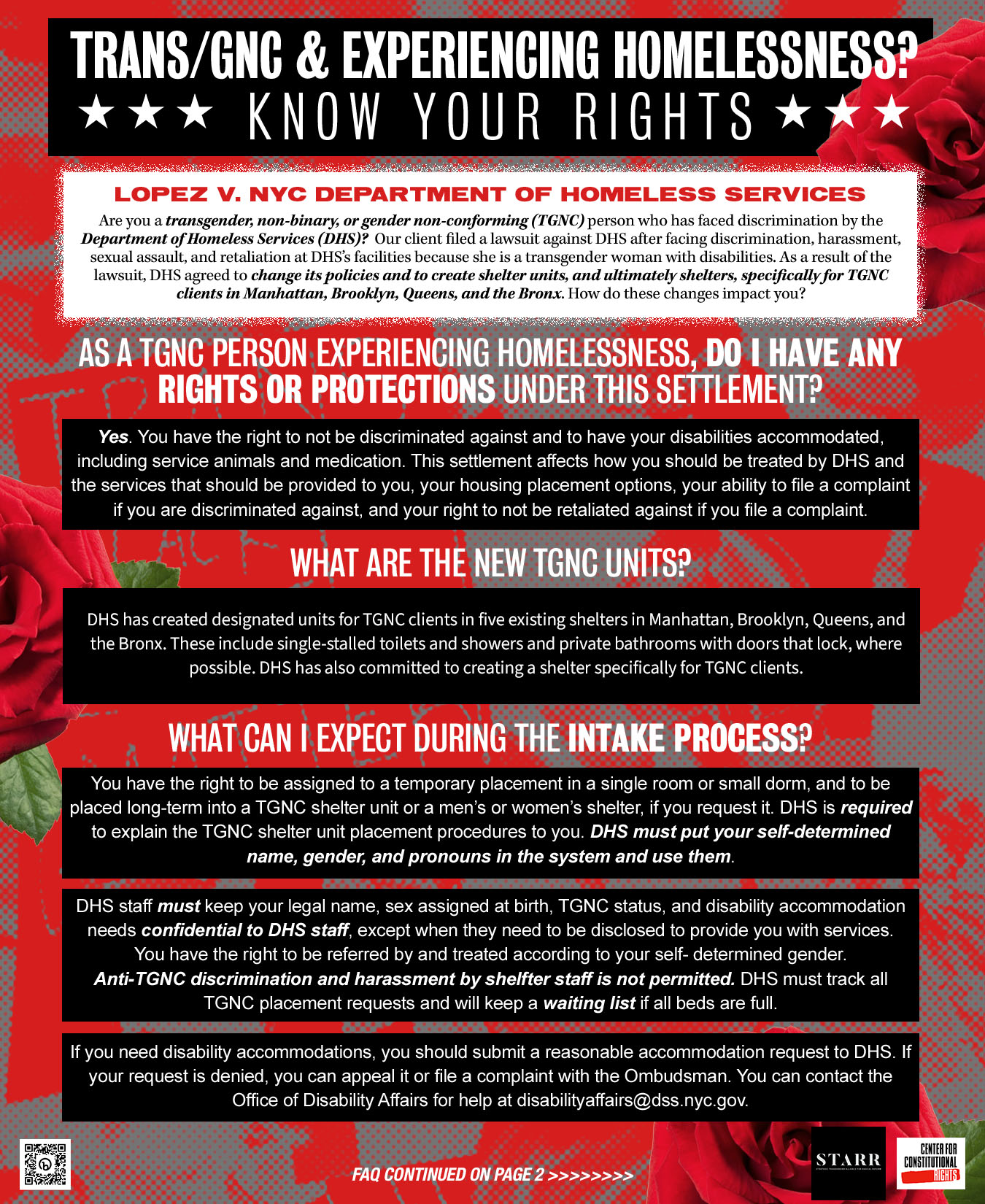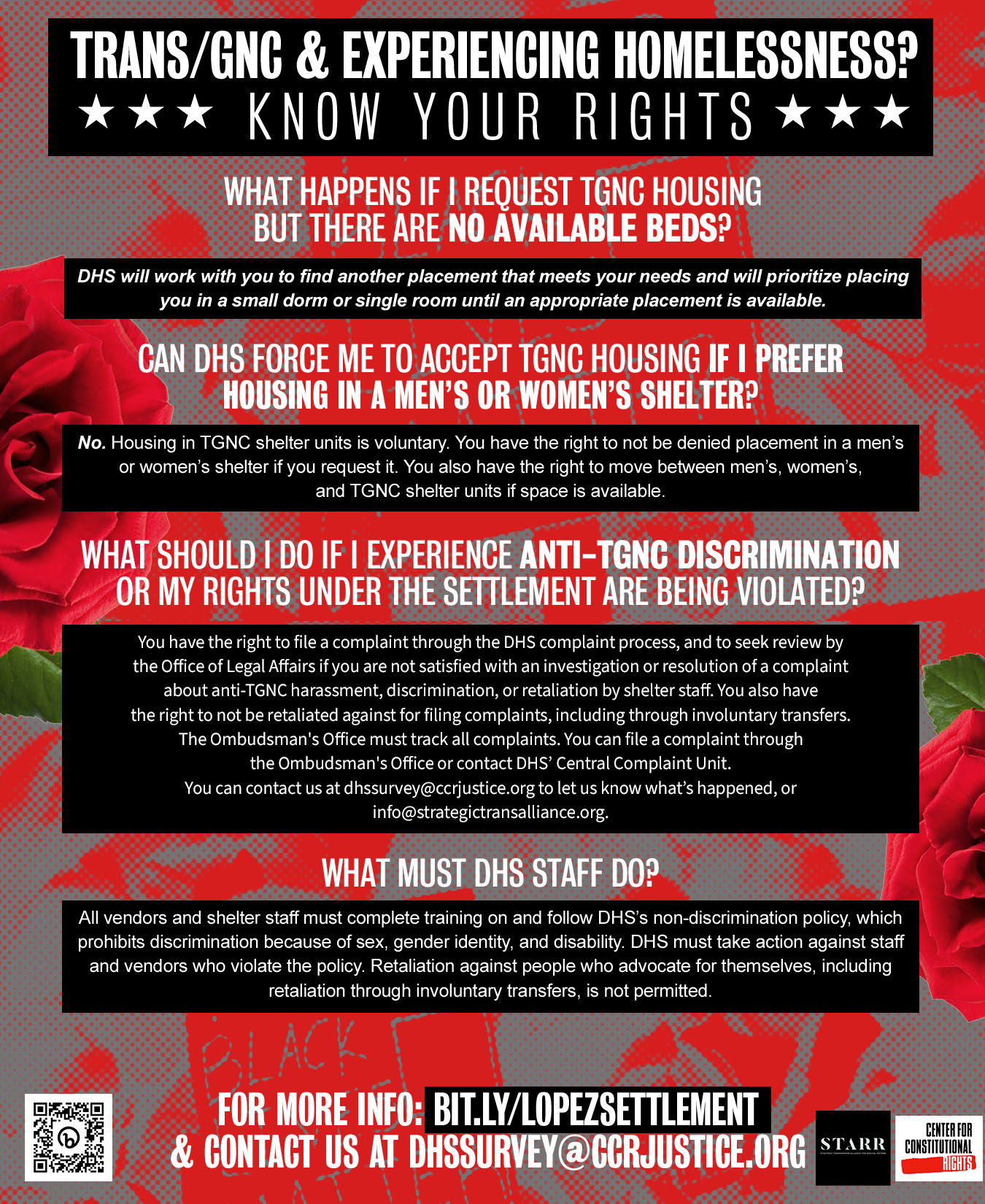*** Know Your Rights in the NYC Department of Homeless Services (DHS) shelter system ***
Are you a transgender, non-binary, intersex, or gender non-conforming (TGNC) person who has faced discrimination by the NYC Department of Homeless Services (DHS)? Our client filed a lawsuit against DHS after facing discrimination, harassment, sexual assault, and retaliation at DHS’s facilities because she is a transgender woman with disabilities.
As a result of the lawsuit, DHS agreed to change its policies and to create shelter units and, ultimately, shelters specifically for TGNC clients in Manhattan, Brooklyn, Queens, and the Bronx.
How do these changes impact you?
As a TGNC person experiencing homelessness, do I have any rights or protections under this settlement?
Yes. You have the right to not be discriminated against and to have your disabilities accommodated—including service animals and medication. This settlement affects how you should be treated by DHS and the services that should be provided to you, your housing placement options, your ability to file a complaint if you are discriminated against, and your right to not be retaliated against if you file a complaint.
What are the new TGNC units?
DHS has created designated units for TGNC clients in five existing shelters in Manhattan, Brooklyn, Queens, and the Bronx. These include single-stalled toilets and showers and private bathrooms with doors that lock, where possible. DHS has also committed to creating a shelter specifically for TGNC clients.
What can I expect during the intake process?
You have the right to be assigned to a temporary placement in a single room or small dorm, and to be placed long term into a TGNC shelter unit or a men’s or women’s shelter, if you request it. DHS is required to explain the TGNC shelter unit placement procedures to you. DHS must put your self-determined name, gender, and pronouns in the system and use them.
DHS staff must keep your legal name, sex assigned at birth, TGNC status, and disability accommodation needs confidential to DHS staff, except when they need to be disclosed to provide you with services. You have the right to be referred to by and treated according to your self-determined gender. Anti-TGNC discrimination and harassment by shelter staff is not permitted. DHS must track all TGNC placement requests and will keep a waiting list if all beds are full. You can contact the Office of LGBTQI Affairs for help with TGNC placements and other issues at [email protected] or 929-221-8553.
If you need disability accommodations, you should submit a reasonable accommodation request to DHS. If your request is denied, you can appeal it or file a complaint with the Ombudsman. You can contact the Office of Disability Affairs for help at [email protected].
What happens if I request TGNC housing but there are no available beds?
DHS will work with you to find another placement that meets your needs and will prioritize placing you in a small dorm or single room until an appropriate placement is available. DHS will keep a waiting list of TGNC placement requests if all beds are full.
Can DHS force me to accept TGNC housing if I prefer housing in a men’s or women’s shelter?
No. Housing in TGNC shelter units is voluntary. You have the right to not be denied placement in a men’s or women’s shelter if you request it. You also have the right to move between men’s, women’s, and TGNC shelter units if space is available.
What should I do if I experience anti-TGNC discrimination or my rights under the settlement are being violated?
You have the right to file a complaint through the DHS complaint process, and to seek review by the Office of Legal Affairs if you are not satisfied with an investigation or resolution of a complaint about anti-TGNC harassment, discrimination, or retaliation by shelter staff. You also have the right to not be retaliated against for filing complaints, including through involuntary transfers.
The Ombudsman's Office must track all complaints. You can file a complaint through the Ombudsman's Office ([email protected] or 800-994-6494) or contact DHS’s Central Complaint Unit at 718-291-4141.
You can contact us at [email protected] to let us know what’s happened, or [email protected].
What must DHS staff do?
All vendors and shelter staff must complete training on and follow DHS’s non-discrimination policy, which prohibits discrimination because of sex, gender identity, and disability. DHS must take action against staff and vendors who violate the policy. Retaliation against people who advocate for themselves, including retaliation through involuntary transfers, is not permitted.
For more info, see bit.ly/LopezSettlement and contact us at [email protected].



